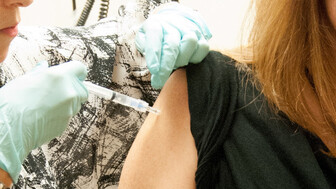Foundation Grants
Community Vital Signs
About Us
Fulfilling a Need in the Face of High Food Prices
Foundation: Andrew W. Mellon Foundation, Collaboratory
It's not every day that a professor gets a $2 million award from Rutgers University, but that's exactly what Dr. Juan Carlos Galindo did last week, the New York Times reports.
Galindo's research focused on the effects of stress on the body's ability to heal itself.
In his paper, published in the Journal of Clinical Investigation, Galindo used MRI scans to create a three-dimensional model of the body's tissues and compared them to images of people with and without chronic stress.
He found that people with chronic stress were more likely to have a lower level of troponin, a measure of how much damage the body does to itself, than those with chronic stress who didn't have it.
He also found that people with chronic stress were more likely to have an increased risk of heart attack and stroke.
Galindo tells the Times that he was "shocked" by the results.
"I had never seen anything like it before," he says.
"It was shocking to me."
He says he hopes his findings will lead to more research into the effects of chronic stress on the body's ability to heal itself.
In the meantime, he's trying to figure out a way to make it easier for people with chronic stress
Read the Entire Article
Selected Foundation News
A customized collection of news from foundations from around the Web.
KOIS has appointed Impact and Influence (I&I) as its strategic communications partner.I&I will focus on accelerating Brussels-headquartered KOIS Advisory's growth through greater visibility in the...more
For Navya, the lockdown revealed stark inequities faced by women in India, particularly in underserved areas.She established Project Naveli with three core objectives: addressing healthcare needs,...more
Davos: Young people put pressure on WEF's rich and powerful.The annual meeting brings together thousands of participants, including many politicians and company bosses from all over the...more
Sebi proposes broader definition of NPOs, expanded activities under Social Enterprise.Sebi proposes broadening the definition of Not-for-Profit Organizations (NPOs) and expanding eligible activities...more
Small Business Britain unveils 2025a€™s most inspiring female entrepreneurs.Campaign showcases female founders driving innovation and impact across sectors including health, sustainability,...more
Global Health Education Program (G-HEP) 2024 Lecture 9: Solving Planetary Health Challenges in Japan and a Changing World (October 10, 2024) - Health and Global Policy Institute.The global health...more
Young entrepreneurs from Cumbrian primaries raise 3k for charity ':"";if(a){var r=n.promos.showYahooLogo?"":"yns-no-logo";a=a.replace("{notifOnboardBtnLabel}",n.Promos.notif onboardLabel),r=r;return...more
The Schwab Foundation Awards 2025 celebrate 18 social entrepreneurs and innovators from 15 organizations spanning 13 countries.The awardees' groundbreaking solutions are addressing urgent issues and...more
Missouri Farmers Care Foundation awards food security grants to youth groups.46 grants awarded to organizations working to combat food insecurity in their communities.The following groups are among...more
$21.5 million in invested assets.$1.1 million funded in grant awards, scholarships, and fund distributions.$130,000 in scholarships held by GVCF.Our Future Fund was created with a mission to provide...more
New News from...
Quad Cities Community Foundation
Santa Fe Community Foundation
Dubois County Community Foundation
Lilly Endowment
Becton, Dickinson and Company
Lynde and Harry Bradley Foundation
Open Society Foundations
Rockefeller Foundation
Northern Piedmont Community Foundation
Piedmont Community Foundation
Social Entrepreneurship
Spotlight
Covalence EthicalQuote Shares Data on 2013 Most Noteworthy Green Companies

Covalence EthicalQuote, based in Geneva, Switzerland, aggregates numerous online articles. By using an international analytic team, it ranks the article coverage according to criteria based on the Global Reporting Initiative: water management, pollution, biodiversity, product safety, emissions and waste management.

